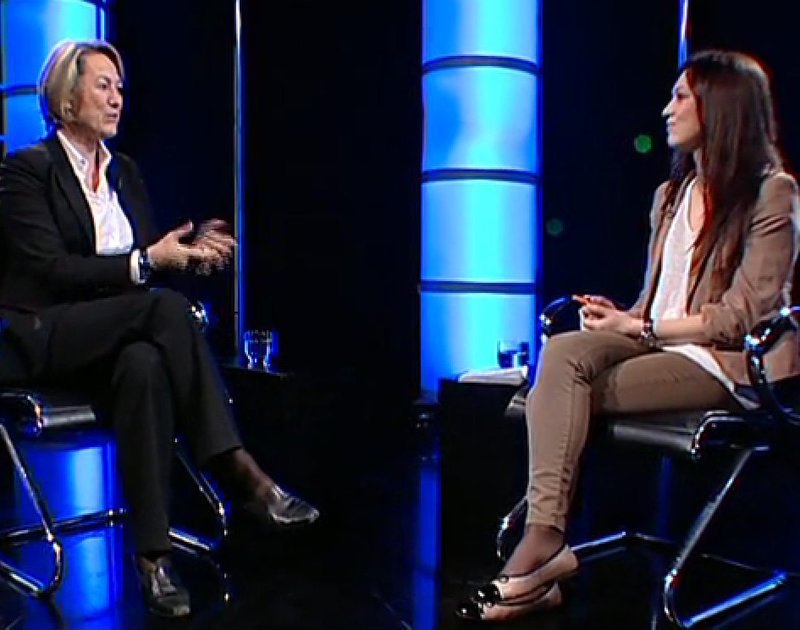Interview
Putting English to the test
Elaine Blaus Marcela interviewed Elaine Blaus, director of Cambridge English Language Assessment for Spain and Portugal, about English teaching and evaluation, and the situation of English in Catalonia.
Your surname doesn't sound very English.
It sounds more Catalan than English but in fact it's Latvian. My father was from Latvia, although I was born in England and my mother is English.
But you have spent a long time living abroad.
I've spent 16 years abroad, a few years in Tarragona, but most of the time I've been in Alicante and now I live in Madrid. I spent a year in Germany, as well.
Tell me about your background?
I studied teaching in England and I have a degree in Russian, but I decided I'd rather go to a warmer country to live so I became a teacher and came straight here. Then I went to Germany for a year and then back to Great Britain and then back to Spain. I was teaching in British international schools until I took up this post a year ago, to work for Cambridge.
How often do you have to come to Barcelona?
My post covers the whole of Spain and Portugal so I travel a lot. Barcelona is such an important place for teaching English that I come here quite often.
Your firm's Spanish section is the second-largest after Cambridge. Why is that?
Language qualifications, and in particular Cambridge language qualifications, are very well known and very important here. When I first arrived, people were talking about First Certificate, and since then it's only grown and grown. So, whereas First Certificate was the big thing, it's now Advanced that has taken over. I think it is a very healthy indication of the state of English learning, the progress that people have made here, which is now moving up to higher qualifications. The figures for the last few years show that the number of candidates taking Cambridge English exams in Spain has grown by 20% each year.
Why have things evolved and changed so much?
There are a few important factors. A few years ago the teaching of English moved into the school sector. Many schools are doing plurilingual and bilingual projects, which means the children start at a younger age and therefore they reach a higher level. The economic crisis has also had an effect on this; it's suddenly become much more important to have a recognised qualification in English.
Does the fact that Catalonia is a bilingual society help English learning?
Absolutely. If you grow up in a bilingual society then your brain has developed in a way that can accept other languages much more easily, so Catalans really have a great advantage over lots of other areas of Spain in terms of learning English.
Portugal has a reputation for being better at English than in Spain.
It's really not true, as you can see in the figures. There are many more people that have Advanced here than anywhere else in the world. Also, the fact that English is now becoming part of school curriculums, the fact that children can be taught Geography in English, for example, helps a lot. That's because you're not learning English, you are learning in English, which gives you a practical reason. In Portugal, they watch TV in original version, which really helps, while in Spain there is a very big dubbing industry.
How did the Cambridge exams start and how have they evolved over time?
It all started just over a hundred years ago, and there's a well-known anecdote about the first Cambridge exam, which was back in 1913. There were three candidates who took the proficiency exam and they all failed. We now operate in 130 countries and every year around the world five million students are tested, and it's growing.
Cambridge exams are not the only evaluation option, but they are the most popular. How did this happen?
It was set up and always run by the University of Cambridge, which is one of the top three university in the world, which provides us with a mark of quality. Everything is done to such a standard of quality and rigour that the tests really stand out ahead of everything else.
Any tips to give to students preparing for the exam?
Children enjoy technology, playing on the computer, video games, so let them do those things, but in English. Read in English, talk to people in English, watch original version on TV and try to do the things you like, but do them in English.
What about the ideal age to start learning English?
It's never too late to start with a language but ideally as young as possible. Learning two or three languages at the same time can be difficult, but ultimately kids race through. The younger you learn a language, the more natural your pronunciation.
Leave a comment
Sign in.
Sign in if you are already a verified reader.
I want to become verified reader.
To leave comments on the website you must be a verified reader.
Note: To leave comments on the website you must be a verified reader and accept the conditions of use.

